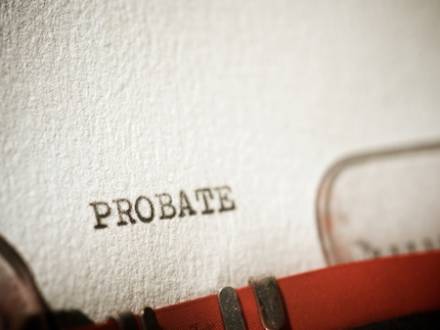Recent Blog Posts
How "Probate" Works
 If you have ever heard the word "probate" and felt a little uneasy, you are not alone. Most people picture a long, expensive legal process that drags on for years after a loved one passes away. However, the good news is that probate in Illinois is often more manageable than people expect, especially with guidance from an experienced Hillside Wills, Trusts and Probate attorney.
If you have ever heard the word "probate" and felt a little uneasy, you are not alone. Most people picture a long, expensive legal process that drags on for years after a loved one passes away. However, the good news is that probate in Illinois is often more manageable than people expect, especially with guidance from an experienced Hillside Wills, Trusts and Probate attorney.
If you are thinking about estate planning in 2026, or you have recently been named to handle a loved one's estate, here are some important things to know.
What Is Probate and How Does It Work in Illinois?
Probate is a legal proceeding that is sometimes required after someone dies. A court oversees the collection of the deceased person's property, the payment of their debts and taxes, and then the distribution of whatever remains to the right people. The person in charge of managing all of this is called the "Executor", if the person left a will, or the "Administrator" if they did not leave a will.
How Exactly Does "Equitable Distribution" Work in an Illinois Divorce?
 The prospect of dividing their shared property is one of the most common reasons spouses delay getting divorced for years, even decades. The prospect of divvying up your belongings – and possibly fighting over them for months or years – can feel like too much to bear, even if your marriage is clearly at its end.
The prospect of dividing their shared property is one of the most common reasons spouses delay getting divorced for years, even decades. The prospect of divvying up your belongings – and possibly fighting over them for months or years – can feel like too much to bear, even if your marriage is clearly at its end.
Under Illinois law, decisions about what happens with a couple’s property are made following an "equitable distribution" model. This means the court tries to divide marital assets and debts in a way that it considers fair, but that does not necessarily mean an equal split.
But what exactly does this mean for you? Will you have to fight over every little thing in court, or can you settle beforehand if you have a good attorney? If you need answers to these questions in 2026, our Hillside, IL family law attorney can help you understand how the rules of property division in divorce will apply to your case.
Can a Prenuptial Agreement Address the Subject of Alimony in an Illinois Divorce?
 A prenuptial agreement, also known as a "prenup" or "premarital agreement," is a legal contract that many couples enter into before getting married. This agreement outlines how certain issues will be handled in case they get divorced. Prenups are particularly used to handle asset and debt division.
A prenuptial agreement, also known as a "prenup" or "premarital agreement," is a legal contract that many couples enter into before getting married. This agreement outlines how certain issues will be handled in case they get divorced. Prenups are particularly used to handle asset and debt division.
Premarital agreements can also address other important financial issues, such as alimony (called "spousal maintenance" in Illinois). If you and your fiancé are getting married in 2026 and considering a prenuptial agreement, and want to know more, a skilled Hillside family law attorney can help.
How Does Alimony Work in an Illinois Divorce?
Before we delve into how alimony can be handled in a prenuptial agreement, it’s important to first understand exactly how alimony works in an Illinois divorce, and when it can be awarded, under 750 ILCS 5/504.
Can I Break My Lease in Cook County, Illinois?
 You signed a rental agreement promising to pay rent for a set period, but then things changed unexpectedly - maybe you got a new job in another state, or your landlord refuses to fix serious problems in your apartment, or you just need to get out of a bad roommate situation. On top of dealing with whatever reason you have for leaving your apartment, now you have to figure out how to break your lease without incurring major expenses. For these reasons and more, breaking a lease can be very stressful.
You signed a rental agreement promising to pay rent for a set period, but then things changed unexpectedly - maybe you got a new job in another state, or your landlord refuses to fix serious problems in your apartment, or you just need to get out of a bad roommate situation. On top of dealing with whatever reason you have for leaving your apartment, now you have to figure out how to break your lease without incurring major expenses. For these reasons and more, breaking a lease can be very stressful.
Fortunately, Illinois law does allow tenants to break their leases early under specific circumstances. Some reasons are protected by state law, while others depend on what your lease says or how your landlord responds. Understanding these rules can help you avoid losing your security deposit, or facing a lawsuit for unpaid rent. If you are hoping to break your lease in 2026, call our Oak Park civil law attorney for tenants and renters.
How Marital Property is Divided in an Illinois Divorce
 The challenges of separating two lives in a divorce are often compounded by serious financial concerns. The most common of these concerns is how marital property will be divided. Determining what marital property is and how much you’ll have left after a divorce can lead to sleepless nights and fear of the future.
The challenges of separating two lives in a divorce are often compounded by serious financial concerns. The most common of these concerns is how marital property will be divided. Determining what marital property is and how much you’ll have left after a divorce can lead to sleepless nights and fear of the future.
These worries can be mitigated with a good divorce lawyer’s advice and negotiating skills. At the Law Office of Vincent C. Machroli, P.C., our Hillside divorce attorney has 38 years of experience in guiding clients through the marital property division process. Whether your assets are simple or complicated, we can help.
What is the Difference Between Marital Property and Separate Property?
Before your divorce can move forward, you need to understand which assets and debts must be divided. To do this, you need to know exactly what is marital property and separate property.
What Are Your Options When a Dealership Won't Fix Your Car?
 Many people have had the experience of buying a car from a dealership that immediately or shortly thereafter has problems. The check engine light comes on repeatedly; the transmission slips; strange noises come from under the hood; it won’t start up in cold weather. Many conscientious dealerships will agree to remedy cars they have sold that have early-onset problems. But unfortunately, frequently dealerships say these issues are normal, or refuse to fix them under warranty. So what can you do when a car dealership won’t fix your car? Will hiring an attorney help?
Many people have had the experience of buying a car from a dealership that immediately or shortly thereafter has problems. The check engine light comes on repeatedly; the transmission slips; strange noises come from under the hood; it won’t start up in cold weather. Many conscientious dealerships will agree to remedy cars they have sold that have early-onset problems. But unfortunately, frequently dealerships say these issues are normal, or refuse to fix them under warranty. So what can you do when a car dealership won’t fix your car? Will hiring an attorney help?
At the Law Office of Vincent C. Machroli, P.C., our Hillside, IL civil litigation attorney can help you deal with an uncooperative car dealership without going to court. Whether you need to have a warranty reviewed to understand your rights, negotiate for a fair cost of repair or replacement, or simply let a car dealership know you can’t be bullied around, we can help. We are a small firm, and we have always had a strong emphasis on highly-personalized customer service. Call 708-449-7404 today.
Do You Have a Will? You Should Know About the "Spousal Elective Share"
 You drafted a will leaving your property to your children from a previous marriage; you gave your current spouse specific assets; you now think your estate plan is complete. But did you know that Illinois law may give your spouse the right to reject your last will and testament and claim a larger portion of your estate instead? This right is called the "spousal elective share", and it can completely override your carefully planned estate distribution.
You drafted a will leaving your property to your children from a previous marriage; you gave your current spouse specific assets; you now think your estate plan is complete. But did you know that Illinois law may give your spouse the right to reject your last will and testament and claim a larger portion of your estate instead? This right is called the "spousal elective share", and it can completely override your carefully planned estate distribution.
Understanding how Illinois’ elective share law works helps you create an estate plan that reflects your wishes, while also accounting for your spouse's legal rights. Ignoring these rights can lead to family conflict and court battles after your death. Avoid this by working with our skilled Oak Park, IL estate planning attorney.
Who Gets to Stay in Our House During the Divorce?
 For many couples, one of the hardest questions at the start of a divorce is what to do about their living situation. Living apart from your spouse may seem like the obvious next step, but, as nice as that might sound, the reality is that in 2025, many people cannot afford to pay for two separate households while their divorce is still in progress.
For many couples, one of the hardest questions at the start of a divorce is what to do about their living situation. Living apart from your spouse may seem like the obvious next step, but, as nice as that might sound, the reality is that in 2025, many people cannot afford to pay for two separate households while their divorce is still in progress.
If you are a stay-at-home parent, or if you expect to pay child support or spousal maintenance, you may be worried about whether you can afford to leave. If you cannot afford to leave, you may be worried that a court will order you to leave anyway.
At the Law Office of Vincent C. Machroli, P.C., our Hillside, IL divorce lawyer can help you understand your options for where you might live during your divorce matter so you can approach the divorce process with as much confidence and preparedness as possible.
Do My Spouse and I Have Equal Rights to the Marital Home?
In Illinois, both spouses have the right to remain in the marital home until a court says otherwise. Even if the house is titled or mortgaged in only one spouse’s name, it is still considered marital property if it was bought during the marriage. This means that neither spouse can force the other to leave without a court order.
What Should I Expect at a Divorce First Court Date?
 When you are facing a divorce first court date in Illinois, it is normal to feel nervous. The process can be strange and unfamiliar, especially if it is your first time in court. Understanding what will happen before, during and after the hearing can help you stay calm and confident.
When you are facing a divorce first court date in Illinois, it is normal to feel nervous. The process can be strange and unfamiliar, especially if it is your first time in court. Understanding what will happen before, during and after the hearing can help you stay calm and confident.
Having the help of an experienced Oak Park divorce attorney is the best thing you can do if you are nervous about an upcoming court date. In addition to handling the technical aspects of your case, your attorney will tell you what to expect, what to wear, and how to behave.
How to Dress and Behave in Court
Judges expect everyone in the courtroom to act respectfully. Dress in clean, modest professional clothing. When you enter the courtroom, turn off your phone and take off your hat. Address the judge as "Your Honor" and do not interrupt when someone else is speaking.
Can Anything Be Changed After a Divorce Decree is Final?
 Once a judge signs the final divorce decree, most people hope to close that chapter and move forward. But, of course, life does not stop changing after a divorce. New jobs, health issues, remarriage, or moves out of state can make the original court decree hard to follow.
Once a judge signs the final divorce decree, most people hope to close that chapter and move forward. But, of course, life does not stop changing after a divorce. New jobs, health issues, remarriage, or moves out of state can make the original court decree hard to follow.
In Illinois, certain parts of a divorce decree can be changed after it becomes final, but others cannot. If you need to change a court order, first you need to know which parts of your decree are open to modification, and what steps you must take. Our knowledgeable Hillside, IL family lawyer can help you ask the court for changes that reflect your current situation.
Can Child Custody or Parenting Time Be Changed?
Child custody and visitation — now officially known in Illinois as "parental responsibilities" and "parenting time" — can be changed if the court finds that doing so is in the child’s best interests. Under Illinois law, parents must show a "substantial change in circumstances" since the last custody order. Examples might include one parent’s relocation, a change in work hours, or concerns about a child’s safety or wellbeing.

















